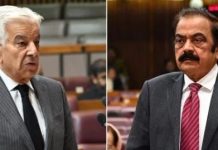Qamar Bashir
In all wisdom, the Constitution has bound the government, legislature, and judiciary in their respective spheres, and none is above or beyond it.”Every law enacted by the parliament is subject to interpretation by the Supreme Court in light of the ideals and purposes of the constitution. It is the prerogative of the legislature to amend the constitution and pass laws; it is the responsibility of the judiciary to determine whether such laws violate the fundamental structure of the constitution.
Most countries have settled the question of which pillar is superior to the other shortly after their establishment, but in Pakistan, forced by our vested interest, we bring up the issue whenever and wherever it suits the authorities who matter in Pakistan. Despite the fact that the constitution has assigned each pillar a distinct function, jurisdiction, and level of importance, it has not favored one over the others. Parliament cannot pass a law that contradicts the fundamental structure of the constitution until the constitution is amended and the amendment is in harmony with its fundamental structure of the constitution. Once a law is enacted, the parliament gets out of it and the jurisdiction of the Supreme Court starts which has the exclusive and final authority and a last resort to evaluate it against the constitution and declare it constitutional or invalid. The constitution so zealously protects the independence of the judiciary that even the parliament cannot amend the constitution to clip the review powers of the judiciary. The matter was decided in the case of Minerva Mills Ltd. v. Union of India in 1980. The Indian Supreme Court was asked to decide whether the government had the power to amend the Constitution to curtail the power of judicial review. The court held that the power to amend the Constitution did not include the power to destroy its basic structure, which included the power of judicial review. The court held that the Constitution was supreme and that no branch of government, including Parliament, could override its basic structure. In the Marbury v. Madison, 1803 case, the US Supreme Court was asked to decide whether a law passed by Congress was constitutional. The court held that it had the power of judicial review and that it could strike down laws passed by Congress if they were unconstitutional. The court also held that the Constitution was supreme and that no branch of government, including Congress, could violate its provisions. In this sense, the judiciary is seen as a co-equal branch of state with the legislative and executive branches.
In India, there have been several instances where the Supreme Court has overruled decisions taken by the government or the legislature. For example, in 2016, the court struck down a law passed by the parliament that allowed convicted lawmakers to continue holding office. The court held that the law violated the constitutional principle of separation of powers and undermined the integrity of the political system.
Sadly, even after more than seventy-five years of this beleaguered nation’s existence, we as a nation continue to struggle to define and redefine the jurisdiction and superiority of the parliament over judiciary, or the executive and vice versa not on the basis of merit, objectivity, national interest, or welfare of the people, but rather swaying every now and then in the direction best suited to the vested interests. When in power, the parties conveniently pursue one position, but when in opposition, they perform a complete 180 and develop the exact opposite narrative. This war of imposing superiorities of one pillar over the other pillar has taken an ugly turn in Pakistan, where the entire opposition sits outside the assemblies and the legislature has become an extension of the government. They, both motivated by the similarity and unity of their vested interests, have joined hands to arm-twist the judiciary, reduce it to a state of irrelevance, and erode its power to the point where it becomes an extension of the executive-parliament incapable of making independent decisions.
Parliament and the Executive have adopted the same tone and tenor when criticizing the superior judiciary on trivial accounts and matters and questioning each and every action taken by the chief justice, including formation of benches, allocation of business to the judges, and transfer of cases from one judge to the next, despite the fact that it is the sole prerogative of the chief justice to allocate business to the judges and run the superior judiciary as he or she deems appropriate. Perhaps this is only occurring in Pakistan, where we are unable to resolve fundamental questions about our existence and the purpose of our institutions. In Pakistan and everywhere in the world, the chief justice has the authority to form court benches to hear and decide cases, determine the composition and number of judges on each bench, and transfer cases from one bench to another and to assemble larger benches to hear cases of great public importance. In the United States, the Chief Justice has the authority to assign judges to different circuits and panels of the U.S. Courts of Appeals, as well as the power to temporarily assign judges from different circuits to sit on another circuit when necessary. In India, the Chief Justice has the authority to form Supreme Court benches, assign cases to these benches, transfer cases between benches, and refer cases to larger benches for hearing and decision. In the United Kingdom, the Lord Chief Justice assigns judges to different cases and circuits in the High Court and Court of Appeal, transfers cases from one court to another, and establishes new courts or tribunals as needed.
The truncated and opposition less parliament, which even perhaps lacks the moral authority or justification to make laws, is hell-bent on reducing the powers of the chief justice and handing them over to its hand-picked and cultivated judges without considering the grave and far-reaching consequences of removing the power, which is a crucial aspect of judicial administration around the world and plays a vital role in ensuring the fairness, efficiency, and independence of the judicial system. If the Chief Justice loses the authority to form benches and assign cases, there may be delays in the hearing and resolution of cases leading to confusion and inefficiency in the court system and resultant delay in the administration of justice for litigants. Without central authority, benches will be formed with biases or favoritism based on personal or political affiliations rather than qualifications and experience.
In all established democracies however, in general, Parliament cannot overturn the decisions of the courts related to the allocation of funds for organizing elections if it is required by the constitution. The separation of powers principle, which is a fundamental principle of most democratic systems, means that the judiciary is an independent branch of the state with the power to interpret the law and make decisions based on it. Therefore, if a court decision is made in accordance with the constitution, the Parliament cannot overturn it through legislative action. However, Parliament may have the authority to amend the constitution to change the provisions related to the allocation of funds for organization elections. This would however, require a vote by a ⅔ majority of members of Parliament.
The case in hand is the allocation of funds to the Election Commission for holding elections for the Punjab Assembly which triggered an onslaught of judiciary by Executive-Legislature. Unlike the current constitutional deadlock in Pakistan, in such situations in many other countries, the orders of the courts were obeyed without any reservation. In 2019, the Philippine Commission on Elections (COMELEC) requested the court to order the government to provide additional funds to cover the expenses for the May 2019 midterm elections. The request was granted, and the funds were released in time for the elections. The court’s decision was also endorsed by the legislature. In 2020, the Supreme Court of India directed the Election Commission of India (ECI) to conduct elections in the state of Bihar by November 2020. The ECI requested additional funds from the government to cover the expenses for the elections, and the government immediately released the funds. The legislative branch also passed a resolution supporting the government’s decision to provide the funds for the elections.
I have not the slightest doubt that the competent legal aids of the executive and legislative branches are fully aware of the fundamental and unavoidable need to uphold the provisions of the constitution, which provide the basis and foundation of a civilized society as opposed to the law of the jungle. Then, what are the stakes that motivate the Executors-legislatures to band together against the constitution and the judiciary, which is making every effort to uphold the relevant provision of the constitution?
In an interview that aired today (18 April 2023), the Defence Minister elaborated on what makes Punjab elections so exceptional and high-stakes. If elections are held, the entire effort to change the regime will be in vain. According to him, whichever party in this case PTI won the elections in Punjab, which accounts for 65% of the country’s population, the same party would certainly sweep the general elections whenever held and may even won two third majority of the parliament, which would be death knell for constituent parties of the PDM especially PML(N), as PPP would most likely retain Sindh and PML(L) would be left with nothing in the center or punjab for the next five years. This will even neutralize Nawaz Sharif, who is eagerly awaiting his return to Pakistan as a celebrity rather than a convict in the hopes of becoming prime minister for a fourth and likely final time, given his age and failing health. This revelation of the truth by a PMN(L) stalwart is ample evidence as to why PML(N) with the tacit support of the establishment is fighting tooth and nail, against every political, administrative, and judicial move which endorses the constitutional provision to hold elections within 90 days in case assemblies are dissolved prematurely, even though they know in their hearts that by doing so they would be trampling the constitution and breaking the law,they are also aware that if they lose this battle, they will lose the opportunity to govern the country for at least the next five years, which is too big a risk to take, even bigger than violating the constitution and facing the contempt of court.
In this war of survival of PDM and especially PMN (N), the constitution and the people of Pakistan are the biggest casualties. This war is not fought on the question of the superiority of one pillar of the state over the other but on the basis that everything is fair in love and war. It is a question of the very existence of PML(N) which is facing imminent routing first in Punjab and later in the center, if the elections are held as per dictates of the constitution. They are using all arrows in their bow to remain in power, buy time, neutralize Imran Khan by hook or by crook and bring Nawaz Sharif back to prop-up PMLN.
In their desperation, they have pushed the constitution away, knowing full well that constitutionality is supreme, not the pillars of the state that operate under the constitution’s dictates or the vested interests. According to the constitution, neither the judiciary nor the legislative or executive branches may exceed their respective limits. The Judiciary should be free from the influence of the executive and the legislature in order to advance the goals of justice. Where the judiciary protects the rights of the people against the encroachment of the government or any other organization or person, the superior courts enforce the fundamental rights of the people through the appropriate writs judicial order- of the nature of Habeas Corpus, Mandamus, Certiorari, Quo Warranto, etc. To render the judiciary impotent is akin to abolishing the constitution and law in the nation, which can only be restored by popular movements.
Now that civil society has awakened once more, we are observing all the necessary signs of civil movement to uphold the constitution and protect the judiciary from the combined assault of the Executive and the legislature. Let us hope and do everything in our individual and collective power to uphold the country’s constitution and rule of law, which are the foundation of a civilized society.
The writer is the Former Press Secretary to the President, Former MD, SRBC, Former Minister Press, Embassy of Pakistan to France

















